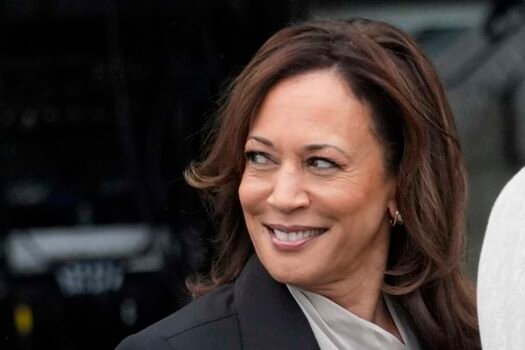Current State of the Presidential Election
The current landscape of the presidential election is dynamic, marked by significant developments from both major parties. As the campaign season progresses, Vice President Kamala Harris has been making strategic moves to solidify her position within the Democratic Party. She is emerging as a pivotal figure, particularly as President Joe Biden’s administration continues to navigate complex socioeconomic issues.
On the Republican side, potential contenders are actively positioning themselves for a potential run. Notable figures such as former President Donald Trump, Florida Governor Ron DeSantis, and former South Carolina Governor Nikki Haley are among the names frequently mentioned. Each brings a distinctive approach and platform, reflecting the diverse ideologies within the Republican base.
Currently, polling data suggests a competitive race. Vice President Harris has garnered considerable support among Democratic voters, especially within minority communities and progressive circles. However, her approval ratings are influenced by the administration’s handling of key issues such as the economy, healthcare, and immigration.
Republican candidates are capitalizing on these issues, framing them as points of contention to rally their base. Former President Trump continues to command significant influence within the party, often overshadowing other contenders. However, Governor DeSantis is rising in popularity due to his stance on state policies and his firm opposition to certain federal mandates. Nikki Haley, with her foreign policy experience, appeals to a segment of the GOP that prioritizes international affairs and national security.
The political climate is charged, with voters deeply divided on several fronts. Key issues such as inflation, the COVID-19 pandemic response, and climate change are at the forefront of the public discourse. Recent developments, including legislative victories or setbacks and high-profile endorsements, are also shaping the narrative and could be pivotal in swaying undecided voters.
As the election approaches, the candidates’ strategies and public perception will play crucial roles in determining the outcome. Continued developments in polling and public opinion will be essential to watch as we move closer to election day.
Challenges Facing Kamala Harris
Kamala Harris’s campaign for the presidency is marked by several formidable challenges, with her stance on transgender care options for children being a particularly contentious issue. Harris has been vocal in her support for puberty blockers and hormone therapies, advocating these as necessary healthcare options for transgender youth. However, this position has been perceived by many parents, and the younger generations who will be future parents, as extreme and potentially harmful.
The debate over transgender care for minors is a deeply polarizing topic in American politics. Proponents argue that access to puberty blockers and hormone therapies can be life-saving for transgender children, offering them the opportunity to align their physical appearance with their gender identity. These advocates see Harris’s support as a stance for inclusive and comprehensive healthcare that respects the rights of transgender individuals.
Conversely, opponents of these therapies raise concerns about the long-term effects and ethical implications of providing such treatments to children. They argue that making life-altering medical decisions at a young age can have irreversible consequences, both physically and psychologically. This apprehension is particularly pronounced among parents who fear the potential risks and question the adequacy of existing research on the safety and efficacy of these treatments.
This controversial stance could have significant implications for Harris’s electability. While her support for transgender care options may resonate with progressive voters and LGBTQ+ advocates, it risks alienating a substantial segment of the electorate. Parents worried about the impact of such policies on their children’s future health and well-being may view her position as a reason to withhold their support. Furthermore, the topic’s sensitivity may lead younger voters, who are future parents, to reconsider their stance on her candidacy.
In a highly polarized political environment, the nuances of Harris’s position on transgender care for children could become a defining issue of her campaign. Successfully navigating this challenge will require balancing advocacy for marginalized communities with addressing the concerns of apprehensive voters.
Potential Strategies for Kamala Harris to Win the Election
In the evolving landscape of the presidential election, Kamala Harris faces several significant challenges that require keen strategic maneuvers. To turn her campaign around, Harris must address contentious issues head-on, revising her stance where necessary to align more closely with voter concerns. One such area is her position on transgender care options, which has been a focal point of debate. By clearly defining and articulating a balanced policy that respects individual rights while considering broader societal implications, Harris can appeal to a wider voter base.
Beyond specific policy adjustments, Harris needs to focus on broad, resonant issues that touch the everyday lives of citizens. Emphasizing economic equity, healthcare accessibility, and climate change initiatives can help her connect with a diverse electorate. These policy areas not only reflect the pressing concerns of many Americans but also provide Harris with a platform to showcase her commitment to substantive change.
Effective communication strategies are paramount in repairing Harris’s image and rebuilding voter trust. Engaging in open dialogues through town halls, leveraging social media for transparent and frequent updates, and participating in debates with a calm, confident demeanor can significantly enhance her public perception. Additionally, highlighting personal stories of people positively impacted by her policies can humanize her campaign and forge an emotional connection with voters.
Another crucial element is the strategic use of endorsements and alliances. Garnering support from influential figures within the Democratic Party, as well as respected community leaders, can boost her credibility and appeal. Collaborating with grassroots organizations to mobilize on-the-ground efforts will also be instrumental in gaining traction among undecided or skeptical voters.
Finally, Harris must maintain a consistent and authentic message. Voters are drawn to candidates who exhibit integrity and reliability. By staying true to her core principles while demonstrating a willingness to adapt and listen, Kamala Harris can strengthen her position and increase her chances of success in the upcoming presidential election.
Former President Donald Trump is currently navigating a series of legal challenges that could significantly impact his campaign for the 2024 Presidential election. These legal troubles encompass investigations into his business practices, alleged interference in the 2020 election results, and other criminal inquiries. Public perceptions of these legal issues have been polarized, with Trump’s ardent supporters viewing the investigations as politically motivated, while critics argue they highlight a pattern of unethical behavior.
The severity of Trump’s legal predicaments cannot be understated. For instance, ongoing investigations by the Manhattan District Attorney and the New York Attorney General into Trump’s financial dealings could potentially lead to indictments. Additionally, the Department of Justice is scrutinizing Trump’s alleged involvement in the January 6th Capitol riot, a charge that carries significant political and legal ramifications. If any of these investigations culminate in criminal charges, Trump’s ability to focus on his campaign and secure public trust may be critically undermined.
One significant concern for Trump’s campaign is how these legal battles might affect voter confidence. While his core base remains steadfast, moderate Republicans and swing voters could be swayed by the controversies. The continuous media coverage of these legal issues keeps them in the public eye, potentially damaging Trump’s reputation further. As a result, the Republican Party faces the conundrum of whether to continue backing Trump or to prepare for a possible last-minute candidate switch. The uncertainties surrounding Trump’s legal status could prompt GOP leaders to consider alternative contenders who can offer a cleaner slate.
The impact of these legal troubles on Trump’s campaign cannot be dismissed. While the former president remains a formidable figure in Republican politics, the ongoing investigations cast a shadow over his potential candidacy. The GOP’s strategy in responding to these developments will play a pivotal role in shaping the 2024 election landscape.
Ron DeSantis: A Strong Backup Candidate for Republicans
Ron DeSantis has emerged as a formidable contender for the Republican nomination, especially if Donald Trump’s legal challenges impede his ability to run. DeSantis, currently serving as the Governor of Florida, has garnered considerable attention for his effective governance and policy initiatives. Under his leadership, Florida has experienced significant economic growth and an influx of new residents, with the state’s population now exceeding 23 million people. This demographic surge has been partly attributed to DeSantis’s pro-business policies and his administration’s efforts to create a favorable economic environment.
Governor DeSantis’s accomplishments extend beyond economic metrics. His decisive actions during the COVID-19 pandemic, such as prioritizing the reopening of businesses and schools, have been lauded by supporters who view him as a champion of personal freedom and economic resilience. Furthermore, DeSantis has implemented several education reforms, including expanding school choice programs and advancing measures to enhance student performance. These initiatives reflect his commitment to fostering an education system that meets the diverse needs of Florida’s growing population.
DeSantis’s leadership qualities have not gone unnoticed on the national stage. His ability to effectively communicate his policies and connect with constituents has solidified his reputation as a pragmatic and results-driven leader. Additionally, his strong stance on issues such as immigration, law enforcement, and fiscal responsibility resonate with a broad spectrum of Republican voters. These attributes make him not only a viable backup candidate to Trump but also a potential frontrunner in his own right.
As the political landscape continues to evolve, Ron DeSantis’s track record as Governor of Florida positions him as a compelling figure within the Republican Party. His blend of policy successes, leadership acumen, and alignment with core Republican values equips him with the credentials needed to mount a serious presidential campaign, should the opportunity arise.
The Republican party is witnessing the emergence of several promising figures who could potentially step into the presidential race if circumstances necessitate a switch. Among these rising stars are Byron Donalds, JD Vance, and Vivek Ramaswamy, each bringing unique backgrounds, political achievements, and compelling narratives that resonate with various segments of the electorate.
Byron Donalds
Representing Florida’s 19th congressional district, Byron Donalds has rapidly become a prominent voice within the Republican party. With a background in finance, Donalds has leveraged his expertise to advocate for economic policies aimed at fostering growth and opportunity. His tenure in the House of Representatives has been marked by a focus on conservative fiscal policies, deregulation, and a strong stance on educational reform. Donalds’ ability to connect with grassroots voters and his commitment to principled conservatism make him a formidable potential candidate in the changing political landscape.
JD Vance
JD Vance, a venture capitalist and the author of the bestselling memoir “Hillbilly Elegy,” brings a compelling personal story and a deep understanding of the socio-economic challenges facing many Americans. His election to the U.S. Senate from Ohio has bolstered his credentials as a policy-maker committed to addressing economic disparities and revitalizing the American heartland. Vance’s emphasis on cultural and economic renewal, coupled with his articulate advocacy for conservative values, positions him as a credible contender who could attract a broad spectrum of voters.
Vivek Ramaswamy
Vivek Ramaswamy, an entrepreneur and author known for his critiques of corporate America’s engagement with social and political issues, represents a fresh and dynamic face within the Republican ranks. His book, “Woke, Inc.,” challenges the intersection of business and politics, advocating for a return to merit-based principles and a focus on innovation and productivity. Ramaswamy’s entrepreneurial success and his stance against what he terms “woke capitalism” appeal to a segment of the electorate concerned with preserving traditional business ethics and personal freedoms.
Together, Byron Donalds, JD Vance, and Vivek Ramaswamy embody the diverse and evolving nature of the Republican party’s emerging talent. Their varied backgrounds and shared commitment to conservative principles could invigorate the party’s platform and broaden its appeal in the upcoming presidential elections.
Comparative Analysis: Kamala Harris vs. Potential Republican Candidates
In the upcoming presidential election, Kamala Harris and the leading Republican candidates present distinct contrasts in terms of strengths, weaknesses, and key policy differences. Harris, as the current Vice President, leverages her experience in national governance and her previous role as a U.S. Senator. Her strengths lie in her advocacy for civil rights, healthcare reform, and environmental issues. These positions resonate with progressive voters and those prioritizing social justice and climate action.
In contrast, potential Republican contenders, such as Ron DeSantis and Nikki Haley, emphasize conservative values, fiscal responsibility, and a strong national defense. DeSantis, the Governor of Florida, is known for his handling of the COVID-19 pandemic and his stance on educational reforms, appealing to voters who prioritize economic stability and limited government intervention. Haley, a former Ambassador to the United Nations, brings a focus on foreign policy and national security, attracting voters concerned with America’s position on the global stage.
One of the significant policy differences between Harris and her Republican counterparts is their stance on transgender care options for children. Harris supports comprehensive healthcare that includes gender-affirming care, emphasizing inclusivity and support for LGBTQ+ rights. This policy appeals to younger voters and progressive demographics who advocate for equal rights and social inclusion. On the other hand, Republican candidates often adopt a more traditional stance, advocating for parental rights and caution in medical interventions for minors. This viewpoint resonates with conservative and family-oriented voters who prioritize traditional family values and parental authority.
Voter demographics play a crucial role in the electoral prospects of each candidate. Harris tends to appeal to urban voters, minorities, and younger demographics who support progressive policies. Her emphasis on social justice and environmental issues aligns with the values of these groups. Republican candidates, conversely, find strong support among rural voters, older demographics, and individuals prioritizing economic conservatism and national security. Their positions on healthcare, education, and defense reflect the priorities of these voter segments.
In conclusion, the comparative analysis of Kamala Harris and potential Republican candidates highlights clear contrasts in their policy stances and voter appeal. Understanding these differences is essential for predicting electoral outcomes and the future direction of national policies.
Election Predictions and Potential Outcomes
The trajectory of the current presidential campaigns suggests several potential outcomes, each contingent on various dynamic factors. One scenario involves Kamala Harris modifying her political stance to appeal to a broader electorate. This strategic shift might enhance her prospects, especially among moderate voters and independents who can sway the election. Political analysts argue that such a repositioning could be pivotal in securing the necessary votes to clinch the presidency.
Another significant factor is Donald Trump’s ongoing legal battles, which could substantially impact the Republican landscape. If Trump’s legal issues intensify, they may lead to a withdrawal or a diminished role in the campaign. Consequently, this would necessitate a recalibration within the Republican Party, potentially paving the way for other prominent contenders. Rising Republican stars, like Ron DeSantis and Nikki Haley, could seize this opportunity to emerge as frontrunners, reshaping the election’s dynamics.
Polling data also offers valuable insights into potential election outcomes. Recent surveys indicate fluctuating voter preferences, reflecting the volatile political climate. For instance, some polls show a growing disenchantment with traditional candidates, suggesting an opening for fresh voices and perspectives. This sentiment could benefit candidates who present themselves as change agents, promising new solutions to longstanding issues.
Political analysts emphasize the importance of key battleground states, where slight shifts in voter sentiment can dramatically alter the election’s outcome. The focus on these states underscores the necessity for candidates to tailor their messages to the specific concerns and priorities of local electorates. Hence, the ability to connect with voters on a personal level in these critical regions could be the deciding factor in the election.
Overall, the presidential election remains highly unpredictable, with numerous variables at play. As campaigns evolve and external factors come into play, the landscape will continue to shift. Candidates’ adaptability and responsiveness to emerging trends and challenges will be crucial in shaping the final outcome. Political experts will be closely monitoring these developments to provide ongoing analysis and forecasts.









